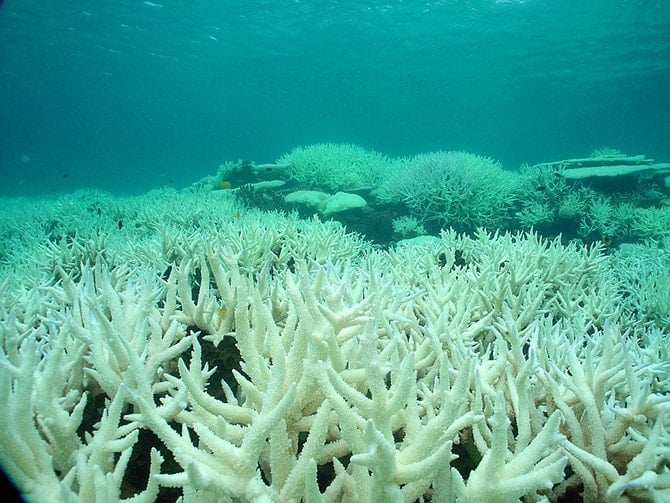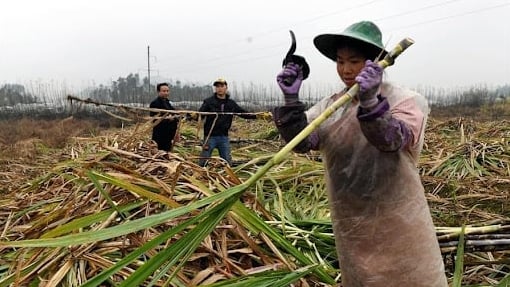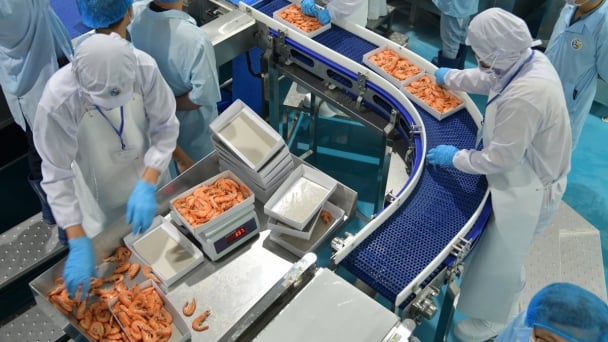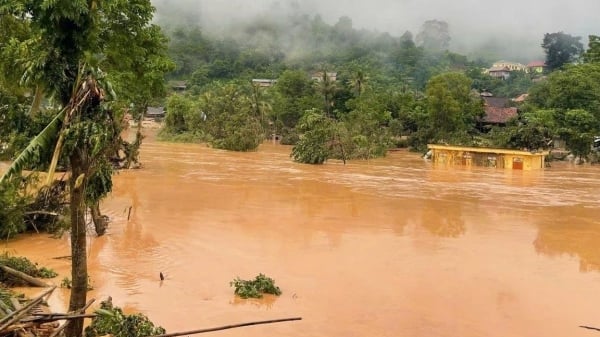July 27, 2025 | 12:03 GMT +7
July 27, 2025 | 12:03 GMT +7
Hotline: 0913.378.918
July 27, 2025 | 12:03 GMT +7
Hotline: 0913.378.918

Marine heatwaves at sea, such as those in Australia, are causing the Great Barrier Reef to bleach and possibly die. Photo: Phys.org.
According to a report from the EU monitor Copernicus, the pace at which oceans are warming has almost doubled since 2005 as global temperatures rise because of human-caused climate change. The findings by the Copernicus Marine Service underscore the consequences of a warming planet on oceans, which cover 70% of earth's surface and acts as a major regulator of the climate.
Ocean warming has "increased continuously" since the 1960s but sharply accelerated in the years since 2005, oceanographer Karina von Schuckmann from Copernicus told reporters. Over the past two decades, the pace of warming has close to doubled from a long-term rate of 0.58 watts/m2 to 1.05 watts/m2.
"Ocean warming can be seen as our sentinel for global warming", said von Schuckmann, a specialist on the unique role the ocean plays in Earth's climate system.
The findings echo the IPCC, the expert panel of climate scientists mandated by the United Nations, on the longer-term heating of the oceans because of humanity's release of planet-heating emissions. Since 1970 some 90% of excess heat trapped in the atmosphere due to the release of carbon dioxide and other greenhouse gasses has been absorbed in the oceans, the IPCC says.
Warmer oceans fuel storms, hurricanes and other extreme weather by influencing global weather patterns and where rainfall lands.
Copernicus said its report detailed "record-breaking ocean temperatures, marine heatwaves stretching down to the deep ocean, unprecedented sea ice loss and rising levels of heat stored in the ocean". It said in 2023, more than 20% of the world's oceans experienced at least one severe to extreme marine heatwave, events that have ripple effects for marine life and fisheries.
Such heatwaves can lead to the migration and mass mortality of certain species, harm fragile ecosystems, and interfere with the flow of deep and shallow waters, hindering the distribution of nutrients. Ocean warming "can affect all aspects of the marine world, from biodiversity to chemistry to fundamental oceanographic processes, currents, and as well as the global climate", said von Schuckmann.
More extensive marine heatwaves also tend to be longer. The average annual maximum duration of such a heat event has doubled since 2008 from 20 to 40 days, according to the latest "Ocean State Report" by Copernicus.
Compared to an earlier baseline, the bottom of the north-east Barents Sea in the Arctic appears to have "entered a state of permanent marine heatwave", said von Schuckmann, citing a research paper. 2023 also saw the lowest sea ice on record in the world's polar regions.
The report said that in August 2022, a temperature of 29.2 degrees Celsius was recorded in the coastal waters of the Balearic Islands off Spain, the warmest in forty years. That same year, a marine heatwave in the Mediterranean Sea stretched to roughly 1.500 meters below the surface, illustrating how heat can reach the deep ocean.
Copernicus noted that ocean acidity had also increased 30% since 1985, another consequence of climate change caused primarily by the burning of fossil fuels. Above a certain threshold, the acidity of seawater becomes corrosive to the minerals used by marine life including corals, mussels, and oysters to make their skeletons and shells.
This threshold - considered a key "planetary limit" by scientists - is expected to be crossed in the near future, according to a report published last week by the Potsdam Institute for Climate Impact Research (PIK).
(AFP)

(VAN) On the afternoon of July 24, Deputy Minister of Agriculture and Environment Hoang Trung held a meeting with Mr. Wang Xianjiang, Deputy Secretary of the People's Government of Yunnan province (China).

(VAN) The Memorandum of Understanding between the two countries establishes a framework and sets priority directions for bilateral cooperation in agriculture, livestock and related fields.

(VAN) Agro-forestry-fishery exports reached USD 33.84 billion in the first half of 2025, up 15.5%. The trade surplus neared USD 10 billion, setting a record and surpassing expectations.

(VAN) The National Steering Committee for Civil Defense held its first meeting to discuss disaster prevention, control, as well as search and rescue efforts for 2025.

(VAN) Deputy Prime Minister Le Thanh Long proposed expanding cooperation between Vietnam and Senegal's Ministry of Water and Sanitation in the fields of irrigation and water resources.

(VAN) The aftermath of Typhoon Wipha has caused severe damage to the border areas of Nghe An province. My Ly commune is among the most heavily affected.

(VAN) More than 115 agrifood experts, government advisors and business leaders are calling for animal-source foods to be excluded from a UN declaration to eliminate trans-fatty acids.